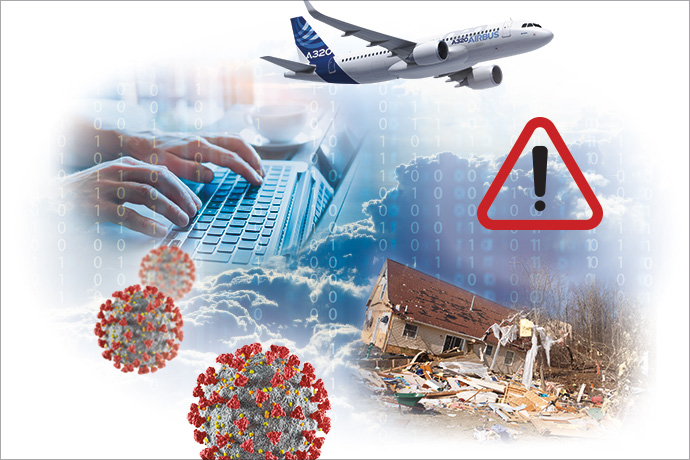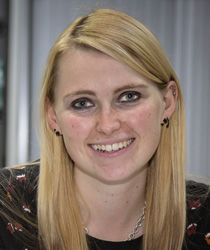

Registration and the call for abstracts are now open for this year’s Using ECMWF’s Forecasts (UEF2021) meeting. The meeting will take place fully virtually from 1 to 4 June 2021. It attracts ECMWF users from across the world to discuss the use and performance of ECMWF’s forecasts and related products.
The UEF2021 theme is ‘Weather in extraordinary circumstances’. The last year and numerous past events have proved that the meteorological community has been able to provide products and services to users in the most extraordinary circumstances.
UEF2021 aims to explore these events and what was done to overcome any impacts, share experiences and learn about collaborative activities so we can be as prepared as possible, as a community, for when something extraordinary occurs.
UEF2021 will be held fully online and will include plenary session talks on a variety of topics, a User Voice Corner, speakers’ corner talks and poster sessions. We also look forward to bringing a variety of interactive elements to UEF2021.
We are exploring ways to facilitate increased and improved networking during the event and sessions bringing together different user communities to discuss their work and any issues. We are also looking into providing a session focusing on new ECMWF products and their use for forecasters and interested users.
Bringing users together
Events like the UEF bring together a diversity of experience and backgrounds with a common interest, in this case meteorology. Last year’s meeting attracted over 220 attendees from 43 countries. The feedback received from users is key for ECMWF to continue to provide world-leading forecasts and develop effective and useful products and services.
February 11th being the UN International Day of Women and Girls in Science, we have chosen to present this year’s UEF edition through the eyes of a few women.
The UN Secretary-General António Guterres calls for an end to the gender imbalance in science. Celebrating women in science, highlighting the contributions of women in the field of meteorology and inspiring the next generation is important to ensure the field continues to prosper and innovate.
“In science, the ability to look at a challenge from a different angle is a true asset,” says ECMWF Director-General Florence Rabier.
“We all benefit when the people working to improve our forecasts and products can draw on a wide range of experiences, backgrounds and perspectives. As the UN International Day of Women and Girls in Science approaches, we at ECMWF renew our commitment to promoting a diverse and inclusive working environment in which all talented scientists can flourish, irrespective of gender.”
We asked two female scientists for their expectations of ECMWF’s user meeting this year.
“ECMWF UEF meetings are an enjoyable way for users to keep their model knowledge current, through the academic presentations of ECMWF staff, and the practical examples of forecast successes and failures from users,” says Isla Finney, Director of Lake Street Consulting. “Knowing which issues should be resolved with the next model update, and which we will need to continue compensating for, enables me to plan ahead and focus in-house research accordingly to optimise use of ECMWF data.”
Jenny Rourke, Head of Production Services Section at ECMWF, says: “It’s very important for me to hear from users of our forecasts, to understand why people use our data, requests for improvements and ideas for the future. The UEF can be useful for us to learn how other organisations function and to gain tips on how we can improve our Research-to-Operations (R2O) process. I also enjoy networking opportunities at the UEF, for meeting colleagues from across Europe and beyond!”
 Becky Hemingway, who coordinates the UEF meeting and other user outreach and engagement activities, describes her own route into science.
Becky Hemingway, who coordinates the UEF meeting and other user outreach and engagement activities, describes her own route into science.
For as long as I can remember I’ve been fascinated by the weather and the oceans. I had a natural curiosity of how and why things happened, ultimately resulting in an interest in STEM-related subjects. At school, I chose subjects I enjoyed – physics, maths, biology, geography, art. However, I distinctly remember my physics class for A-level (16–18 years old) having only five female students, already demonstrating a general disinterest in STEM subjects among girls.
At university, I studied Oceanography. Interestingly, there my classes had around a 50:50 gender split. In 2012, I graduated with a Masters in Oceanography, after which I was fortunate to get an internship at the Met Office where my interest in and knowledge of the weather grew and grew.
I now work at ECMWF; my role involves organising, speaking at and facilitating events, training and meetings with ECMWF users in Member and Co-operating States and globally. I really enjoy the role especially given I get to talk about the weather to a great variety of people from diverse backgrounds!
During my career I have seen an increase in gender diversity in the organisations I have worked in, including at more senior positions, which is greatly positive.
Thematic areas and special sessions
We strive to have as much diversity as we can in all ECMWF events. We welcome submissions from a wide range of experiences and backgrounds to make UEF2021 as useful and interesting as possible for all attendees.
Abstracts are welcomed in four thematic areas and for one special session. The thematic areas focus on:
- Severe weather and hazard forecasting, including extremes and impacts; this theme includes the special session ‘Recent developments in assessing societal impacts of extreme meteorological events at a national level’
- Forecasting in extraordinary circumstances
- Unforeseen impacts of extraordinary circumstances
- Extraordinary collaborations
For more information and to register, see Using ECMWF's Forecasts (UEF2021).
The deadline for submitting abstracts is 19 March 2021.
